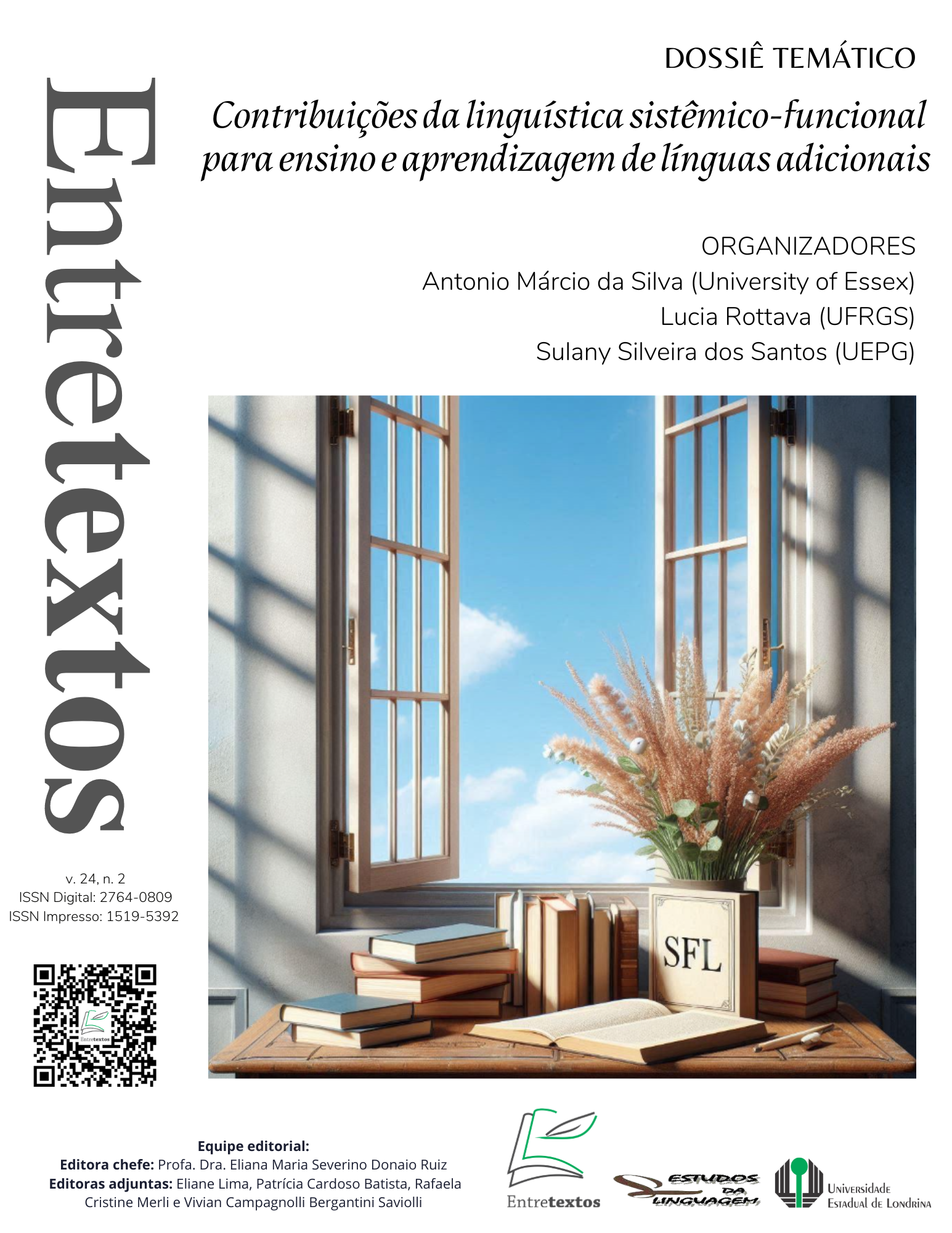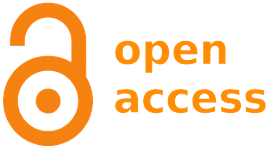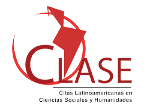Lenguaje disciplinario en contextos bi/multilingües a través de un Enfoque Basado en el Lenguaje para la Instrucción de Contenidos
Palabras clave:
Educação Bi/Multilíngue; Abordagem Sistêmico-Funcional; Formação de Professores.Resumen
Un fenómeno en crecimiento a nivel mundial, la educación bi/multilingue se entiende como aquella en la que diferentes idiomas se integran en el proceso de enseñanza y aprendizaje de contenidos disciplinarios. En Brasil, la integración de idiomas y contenidos plantea un desafío en la formación docente, con el "Enfoque Basado en el Lenguaje para la Instrucción de Contenidos (LACI)" surgiendo como una posibilidad para apoyar las prácticas docentes. Fundamentado en la lingüística sistémico-funcional (LSF), LACI ofrece caminos para descifrar el lenguaje disciplinario, haciéndolo accesible a estudiantes multilingües (EM). A través del análisis de dos textos, uno en inglés y otro en portugués, extraídos de libros de texto de primaria centrados en el estudio de las plantas, se destacan las características del lenguaje disciplinario en el campo de las Ciencias para reflexionar sobre las contribuciones de un enfoque funcional a contextos bi/multilingues.
Citas
ACHUGAR, M.; SCHLEPPEGRELL, M. J.; OTEIZA, T. Engaging teachers in language analysis: A functional linguistics approach to reflective literacy. English Teaching: Practice and Critique, 6(2), 8–24, 2007.
BRISK, M. E. Engaging students in academic literacies: Genre-based pedagogy for K-5 classrooms. Routledge, 2015.
DE OLIVEIRA, L. C. What history teachers need to know about academic language to teach English language learners. The Social Studies Review, 51(1), 76-79,2012.
DE OLIVEIRA,L. C. Supporting Multilingual Learners’ Academic Language Development: A Language-Based Approach to Content Instruction. New York: Routledge, 2023a.
DE OLIVEIRA, L. C. Scaffolded Models for the Integration of Language and Content in Social Studies. NYC Department of Education, 2023b.
DE OLIVEIRA, L. C.; JONES, L.; SMITH, S. L. A language-based approach to content instruction (LACI) for multilingual learners: Six Cs of scaffolding in first grade. Journal of Language, Identity, and Education. DOI: 10.1080/15348458.2021.1885409, 2021.
DE OLIVEIRA, L. C.; LAN, S-W. Writing science in an upper elementary classroom: A genre-based approach to teaching English language learners. Journal of Second Language Writing, 25(1), 23-39, 2014.
EDITORA MODERNA. (obra coletiva / editora responsável Ana Carolina de Almeida Yamamoto) Buriti mais ciências 2º ano - Anos Iniciais do Ensino Fundamental: manual do professor / organizadora Editora Moderna. São Paulo: Moderna, 2021.
EL KADRI, M. Como fica a formação de professores que vão atuar na Educação Bilíngue? algumas reflexões. In: SOUZA NETO, M.J. (org.). Educação Bilíngue no Contexto Brasileiro: perguntas e respostas – Volume 1 – Línguas de prestígio (pp. 35-58). Campinas: Pontes, 2023.
XXXXXX. Inserir título posteriormente. Cidade: Editora, 2022.
FANG, Z. The language demands of science reading in middle school. International Journal of Science Education, 28(5), 491–520, 2006.
GARCÍA, O.; WEI, L. Translanguaging: language, bilingualism, and education. London: Palgrave Macmillan, 2014.
GEBHARD, M. Teaching and researching ELLs’ disciplinary literacies: Systemic functional linguistics in action in the context of U.S. school reform. Routledge, 2019.
GUI, J.; DE OLIVEIRA,L. C. Implementing Code-Breaking With Multilingual Learners:
Principles and Instructional Planning. NYS TESOL Journal, 11(1), 2024, 3-20.
HALLIDAY, M. A. K., & MATTHIESSEN, C. M. I. M. An introduction to functional
grammar (4th ed.). Routledge, 2014.
HARCOURT. Harcourt science. Indiana edition. Harcourt, 2005.
LIBERALI, F; MEGALE, A; VIEIRA, D. A. (Org.). Por uma educação bi/multilíngue insurgente. Campinas, SP: Pontes Editores, 2022
MARTIN, J.; ROSE, D. Genre Relations: Mapping Culture. London: Oakville: Equinox, 2008.
MEGALE, A.; EL KADRI, M. Escola bilíngue: e agora? (Trans)Formando saberes na Educação de professores. São Paulo: Santillana, 2023.
ROTHERY, J. Exploring literacy in school English (Write it right resources for literacy and learning). Sydney: Metropolitan East Disadvantaged Schools Program, 1994.
SCHLEPPEGRELL, M. J. The language of schooling: A functional linguistics perspective. Lawrence Erlbaum Associates, 2004.
WIDA. English Language Development Standards Framework, 2020 Edition. Wisconsin Center for Education Research at the University of Wisconsin–Madison, 2020.
SMITH, S. L., DE OLIVEIRA, L. C. Teaching English language arts to emergent to advanced bilinguals: Current research, theories, and pedagogical practices. In L. C. de Oliveira (Ed.), Handbook of TESOL in K-12 (pp. 291-305). Wiley, 2019.
VYGOTSKY, L. S. Mind in society. Harvard University Press, 1978.
Descargas
Publicado
Cómo citar
Número
Sección
Licencia
Derechos de autor 2024 Luciana C. de Oliveira, Taisa Pinetti Passoni, Michele Salles El Kadri

Esta obra está bajo una licencia internacional Creative Commons Atribución 4.0.
Entretextos adota a Licença Creative Commons Attribution 4.0 International, portanto, os direitos autorais relativos aos artigos publicados são do(s) autor (es), que cedem à Entretextos o direito de exclusividade de primeira publicação.
Sob essa licença é possível: Compartilhar - copiar e redistribuir o material em qualquer suporte ou formato. Adaptar - remixar, transformar, e criar a partir do material, atribuindo o devido crédito e prover um link para a licença e indicar se mudanças foram feitas.















